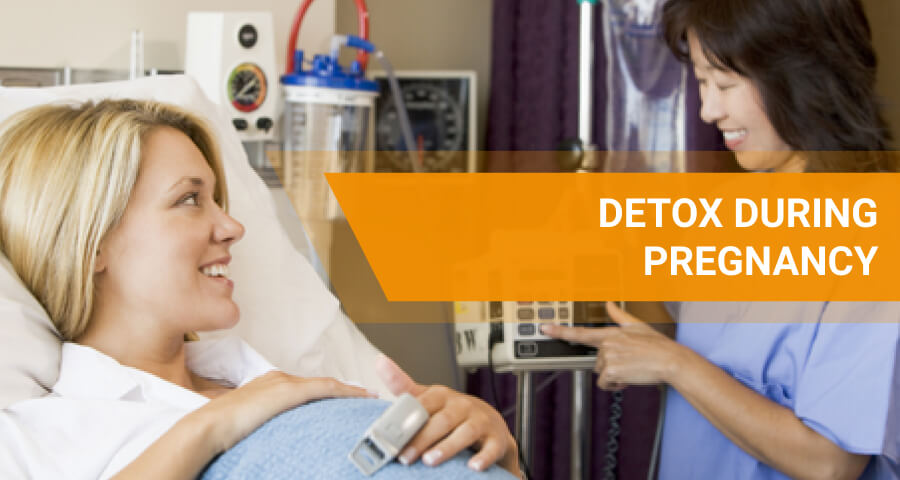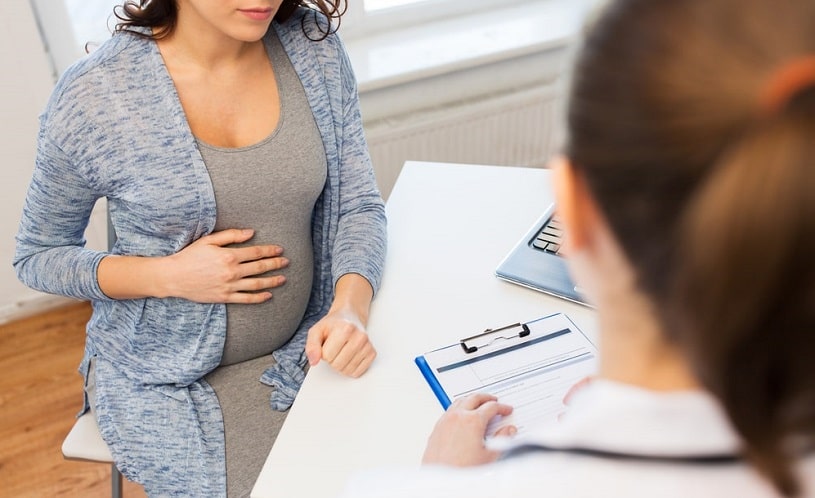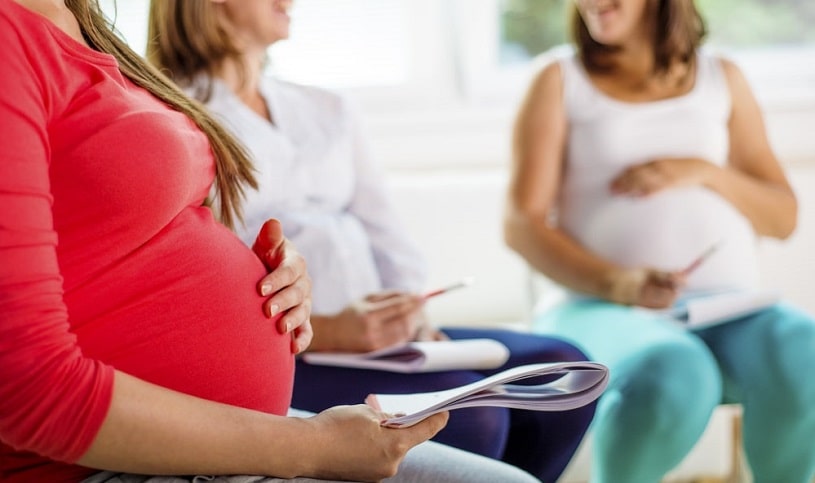
Drug addiction can affect people of any demographic, which includes pregnant women. The risks that drugs can cause to the unborn child can be severe, leading many pregnant women suffering from a substance use disorder to seek medical detox. However, they may also be concerned about the potential health risks of detoxing while pregnant.
Table Of Contents:
This article will discuss how to detox drugs out of system when pregnant, the dangers to the health of the child, and how to get help.
Why Detoxing While Pregnant Is Necessary
Drug detoxing while pregnant is essential for any woman dealing with drug addiction. Addiction to any substance, such as an opioid or alcohol, should be treated with urgency when a woman discovers that she will have a child. That is because an opioid, alcohol, or any other drug, can have severe and life-threatening effects on a child in the womb.
It is best for a woman to go to a professional rehab center for safe detox while pregnant. That is because the treatment of a pregnant woman differs significantly from any other person. Therefore, a lot more care and caution need to be put in place when detoxing while pregnant.
Getting prompt help and treatment sets the woman up for a better drug-free life going forward and greatly reduces the risks of any complications for the child in their life.
Dangers of Drug and Alcohol Use During Pregnancy
As soon as a woman struggling with opioid, alcohol, or any other drug addiction, finds out that she will have a child, the first concern of hers will typically be how her substance abuse might affect the fetus. She may also worry about how her substance use might have already posed a danger to her child before confirming the pregnancy.
Drug or Alcohol Use Poses Many Health Dangers to a Fetus, Including:
- Premature birth
- Birth defects
- Behavioral problems in childhood
- Memory problems
- Underweight babies
- Learning deficits
- Withdrawal symptoms after birth
- Stillbirth
Substance Withdrawal During Pregnancy
Drug detoxing while pregnant is challenging for both mothers and doctors. When an addicted woman goes into withdrawal, the body is severely out of balance, which can harm the fetus.
Factors Affecting the Severity Of Withdrawal
Different substances of abuse have various withdrawal symptoms and complications that may arise.
Factors Like:
- the type of substance used
- the method it was used (smoking, snorting, ingesting, or injecting)
- duration of abuse
- amount of drug abused each time
- biological, genetic, and environmental factors
can all influence how addicted the woman may be. These factors also impact the duration and severity of the withdrawal process.
Generally speaking, the more dependent a person is on a substance, the higher the risk of complications occurring during withdrawal. This is where a supervised process comes in, as it minimizes and manages the difficulties that come with drug withdrawal.

Opiate detoxing while pregnant can be especially troublesome. It can cause respiratory depression in unborn babies, leading to miscarriage, premature labor, or fetal disorders in severe cases. What can help when detoxing from opiates is careful weaning by using an alternate, weaker prescription opioid. The best way to detox from drugs during pregnancy is doing so in a medical facility.
Effects On Fetus
The substance of abuse also gets absorbed in the fetal body and causes addiction. Once the expecting mother stops drug usage, how long do drugs stay in a fetus system? It depends on the type of substance as some take longer to clear from the body than others. Eventually, the fetus may get so addicted to the substance of abuse that upon birth, the baby may undergo neonatal abstinence syndrome, a group of dangerous complications a newborn baby develops when it withdraws from certain drugs exposed to it in the womb before birth.
How to Detox Drugs Out Of System When Pregnant?
To answer how to detox drugs out of system when pregnant, the only proper way to detox while pregnant is to be admitted into a professional drug treatment program for medical detoxification. Attempting detoxification in any other form, such as at home, carries health risks that may potentially harm the fetus.
A drug detox program, particularly an inpatient one, provides the patient with the chance to be supervised around the clock and treated more intensively than would be possible if they were at home. In addition, medical detox allows them to be treated with detox medications that reduce the intensity of the withdrawal symptoms.

In addition, unlike a regular patient, a pregnant woman needs to be monitored with more care. A treatment center allows for round-the-clock care and therapy to ensure that the woman and her child are safe and in good health at all times.
Self Detox While Pregnant – Is It Dangerous?
With such a wide range of adverse effects, natural detox while pregnant can be a dangerous and life-threatening strategy. Upon discovering that they are expecting, women may find it tempting and in the best interest of their baby to stop all drug use immediately and suddenly. Some search the internet for pregnancy-safe detox drinks. Others try holistic cleanses. While some drug detox drinks available in the market claim to work well to cleanse the body immediately, they do not offer a solution for the overbearing craving for the drug. Their efficacy has no solid proof as well.
Moreover, a rapid detox cleanse can cause withdrawal effects in the fetus if it is already addicted to the drug. Hence, these practices can be more harmful to the fetus and the mother.
Home drug detox is not safe, especially as the pregnancy compounds the adverse effects of the process. Under the uncontrolled home environment, the mother or her family would not know how to deal with the many complications during drug withdrawal. It can be fatal for both mother and child. However, some women reject entering inpatient detox during pregnancy, although it is the safest way. In such situations, it is highly recommended to perform detox in an outpatient setting under proper medical supervision instead of cleaning out the system when pregnant at home.
What to Expect During Drug Detoxing While Pregnant?
For women who choose to undergo drug detoxing while pregnant, it is essential to know what to expect. It is similar in many aspects to the treatment that regular individuals receive when they present to a treatment facility, though with more supervision and some differences in the medications being used.
It is pertinent that a woman who is aware that she is pregnant informs the rehab center that she is pregnant, straight from the time they enroll in the center. It will allow the doctors to make the appropriate decisions in care, such as regarding the medications being used. Some of the withdrawal medications used for regular patients can be harmful to a fetus.
Tapering
A doctor will guide the expecting mother on how to undergo safe detox while pregnant. Usually, this is done by tapering the drug of addiction instead of stopping it completely and suddenly, whether it is alcohol, an opioid, or any other drug. Often, it is substituted by an equivalent prescription drug. The prescription drug dosage is tapered off over time. A doctor constructs a tapering schedule based on the level of addiction and may also prescribe safe medicines to deal with some troubling withdrawal symptoms. A rapid procedure is not secure or recommended for expecting mothers because it requires sedation, and a sedated detox tends to have a higher risk of complications.
Mental Health Support
Simultaneous mental health issues that occur with drug usage and withdrawal also significantly affect maternal and fetal health.

Inpatient programs can help women with their mental health and ensure their safety and security while keeping them away from self-harm. Additional antidepressant therapy may be necessary in some women, in which case medical providers choose antidepressants with the safest side-effect profile.
Continuous Recovery
The journey, however, does not end with drug detox while pregnant. After completing the program, it is essential to continue getting treatment and therapy for the underlying factors that led to substance abuse and dependence by following addiction treatment plans and learning skills to avoid relapse. An addiction treatment program may be available at the same facility as the medical detox program. If not, the mother should transfer to a facility that provides this service.
How to Choose a Detox Center for Pregnant Women
Many women continue drug abuse or stop cold turkey when they find out they are expecting instead of approaching a doctor. In the end, it can bring more harm than good. Inpatient detox is the most recommended option in such cases.
Once they decide to pursue detox during pregnancy, many women find it challenging to choose an appropriate detox center. Although many rehab facilities provide comprehensive programs and therapy, only a quarter of these offer services for pregnant women. That is because safe detox while pregnant is more complex and stringent than the regular process for men and women. A properly trained medical team needs to be incorporated to make pregnancy-safe detox programs.
An expecting mother who wants to stop using drugs of abuse should call top-rated drug rehabs in her vicinity and inquire whether they offer detox programs for pregnancy. These programs should then be visited and compared to ensure that the mother feels safe and secure at the facility. The programs are generally designed to be private, confidential, and free from judgment. The medical teams at the centers are sympathetic to the struggles with addiction and understand the need for a mother to get clean. Some centers even offer free medical detox.
Finding other women going through similar programs can provide continued motivation to complete the program. In addition, support groups for women undergoing the same process will help them understand the potential complications and struggles through the detox process and new motherhood.
Hope Without Commitment
Find the best treatment options. Call our free and confidential helpline
Most private insurances accepted
Find Drug Rehabilitation Centers Near You Anywhere In the US
Addiction Resource team has compiled an extensive list of the top drug rehabilitation facilities around the country. Use our locator tool to find the best centers near you.
Page Sources
- Stone R. (2015). Pregnant women and substance use: fear, stigma, and barriers to care. Health & Justice, 3, 2. https://www.ncbi.nlm.nih.gov/pmc/articles/PMC5151516/
- Shainker, S. A., Saia, K., & Lee-Parritz, A. (2012). Opioid addiction in pregnancy. Obstetrical & gynecological survey, 67(12), 817–825. https://pubmed.ncbi.nlm.nih.gov/23233054/
- Bhuvaneswar, C. G., Chang, G., Epstein, L. A., & Stern, T. A. (2008). Cocaine and opioid use during pregnancy: prevalence and management. Primary care companion to the Journal of clinical psychiatry, 10(1), 59–65. https://www.ncbi.nlm.nih.gov/pmc/articles/PMC2249829/
- Ananth J. (1976). Side effects on fetus and infant of psychotropic drug use during pregnancy. International pharmacopsychiatry, 11(4), 246–260. https://pubmed.ncbi.nlm.nih.gov/13047/
- Sachdeva, P., Patel, B. G., & Patel, B. K. (2009). Drug use in pregnancy; a point to ponder!. Indian journal of pharmaceutical sciences, 71(1), 1–7. https://www.ncbi.nlm.nih.gov/pmc/articles/PMC2810038/


 Reviewed by:
Reviewed by:  Written by:
Written by: 

 FindTreatment.gov
FindTreatment.gov